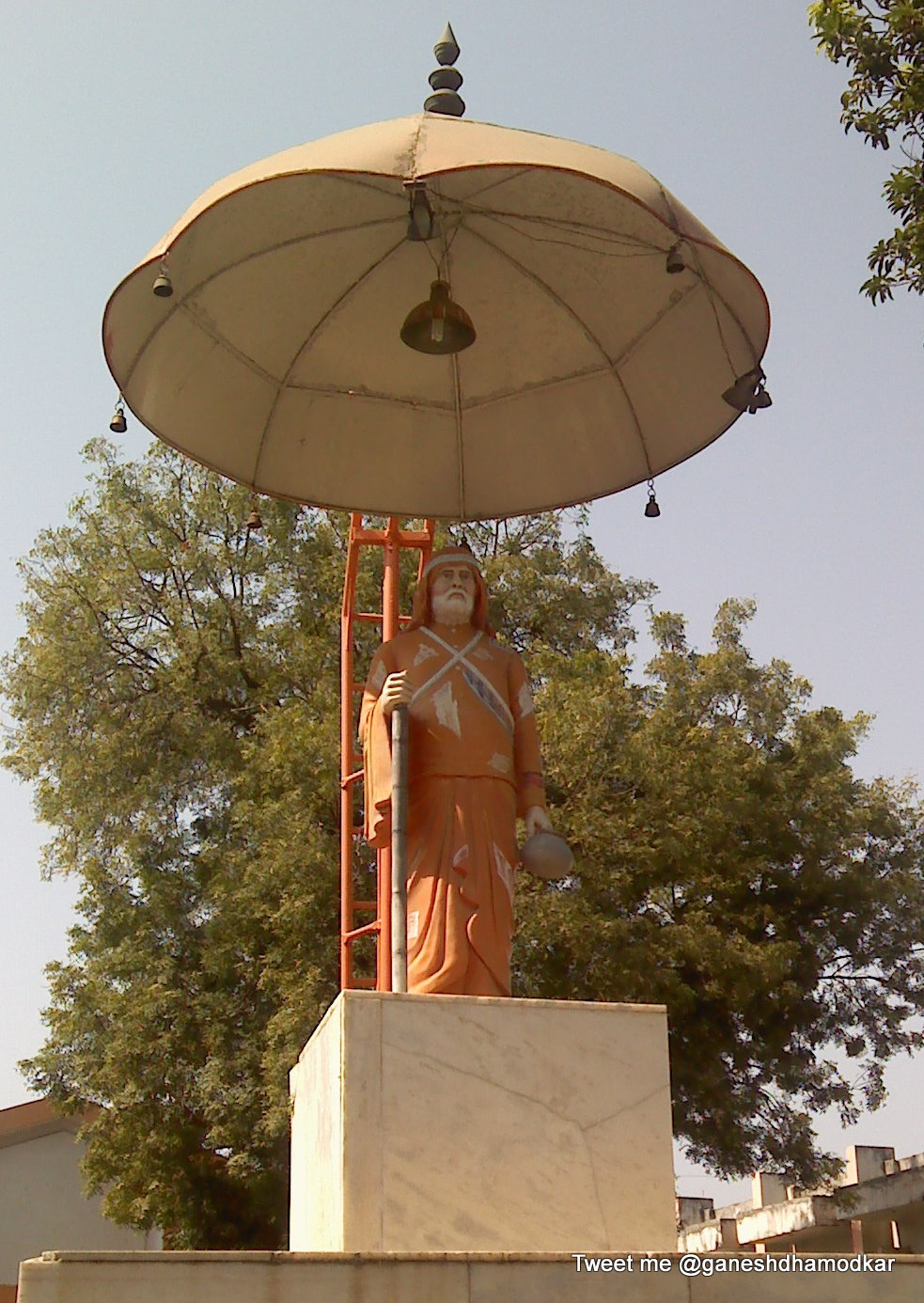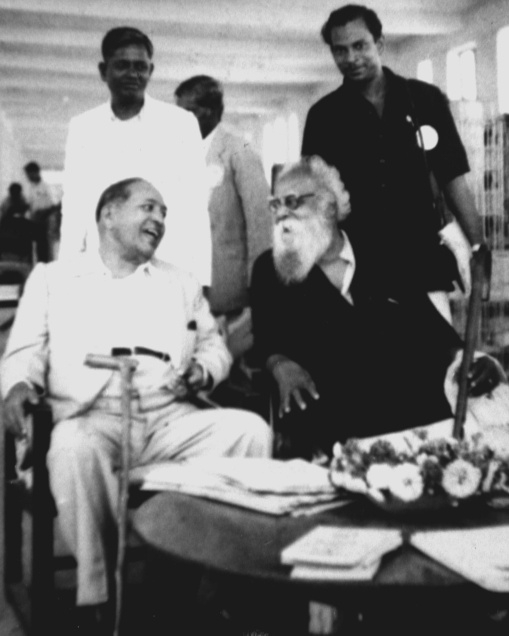|
Gadge Maharaj
Gadge Maharaj (23 February 1876 - 20 December 1956; also known as Sant Gadge Maharaj or Sant Gadge Baba) was an Indian mendicant-saint and social reformer from the Indian state of Maharashtra. He lived in voluntary poverty and wandered to different villages promoting social justice and initiating reforms, especially related to sanitation. He is still revered by the common people in India and remains a source of inspiration for various political parties and non-government organizations. Life and career His original name was Debuji Zhingraji Janorkar. He was born in Shendgaon village in present-day Anjangaon Surji Taluka in Amravati District of Maharashtra to a Dhobi family. A public teacher, he travelled from one place to another wearing his food pan upturned on his head and carrying his trademark broom. When he entered a village, he would instantly start cleaning the gutters and roads of the village. He also told the citizens of the village that their congratulations would h ... [...More Info...] [...Related Items...] OR: [Wikipedia] [Google] [Baidu] |
Shendgaon
The Indian village of Shendgaon is located in the taluka of Anjangaon which is in the district of Amravati in the state of Maharashtra. It is part of the Vidarbha region. Shendgaon is surrounded by Achalpur Taluka in the east, Daryapur Taluka in the south, Chikhaldara Taluka in the north, and Akot Taluka in the west. Marathi language, Marathi is the local language, but Hindi and English language, English are commonly used. It is known as the birthplace of Saint Gadge Maharaj, a peripatetic teacher and social reformer, who recently had a commemorative bust unveiled in his honor. The state government of Maharashtra also runs a village cleanliness program named after him, and the University of Amravati was renamed as Sant Gadge Baba University. Places of interest *Sant Gadge Maharaj Mandir *Chikhaldara Wildlife Sanctuary- 30 km *Melghat Tiger Reserve- 35 km *Washim- 133 km *Burhanpur- 140 km *Sevagram- 158 km Notable people *Gadge Maharaj References [...More Info...] [...Related Items...] OR: [Wikipedia] [Google] [Baidu] |
Dhobi
Dhobi known in some places as Dhoba or Rajaka, Madivala is a group of community in India and the greater Indian subcontinent whose traditional occupations are washing and ironing, Cultivator, agricultural workers. They are a large community, distributed across northern, central, western and eastern India; as well as in Bangladesh, Pakistan, Nepal, and Sri Lanka. A majority of the community associate themselves with Hinduism. Many religiously follow Sant Gadge (Gadge Maharaj), whose ''jayanti'' (birth anniversary) they celebrate every 23 February. The word ''dhobi'' is derived from the Hindi word ''dhona'', which means 'to wash'. As such, Dhobi communities in many areas today come under the status of Schedule Caste in many status, while Other Backward Class in other states and region. In 2017, Supreme Court of India noted calling people ''dhobi'' was offensive. Origins In mythology There is a tradition that they are descendants of the mythological hero Virabhadra,who wa ... [...More Info...] [...Related Items...] OR: [Wikipedia] [Google] [Baidu] |
Activists From Maharashtra
Activism (or Advocacy) consists of efforts to promote, impede, direct or intervene in social, political, economic or environmental reform with the desire to make changes in society toward a perceived greater good. Forms of activism range from mandate building in a community (including writing letters to newspapers), petitioning elected officials, running or contributing to a political campaign, preferential patronage (or boycott) of businesses, and demonstrative forms of activism like rallies, street marches, strikes, sit-ins, or hunger strikes. Activism may be performed on a day-to-day basis in a wide variety of ways, including through the creation of art (artivism), computer hacking (hacktivism), or simply in how one chooses to spend their money (economic activism). For example, the refusal to buy clothes or other merchandise from a company as a protest against the exploitation of workers by that company could be considered an expression of activism. However, the most h ... [...More Info...] [...Related Items...] OR: [Wikipedia] [Google] [Baidu] |
Indian Social Reformers
Notable social reformers in India included *Subramanya Bharathiyaar *Swami Vivekananda * Ishwarchandra Vidyasagar *Debendranath Tagore *Rabindranath Tagore *Mahatma Gandhi * Dwarkanath Ganguly *Gopal Ganesh Agarkar *Baba Amte *Javaid Rahi *Pandurang Shastri Athavale *Basavanna *Vinoba Bhave *Gopal Hari Deshmukh *Virchand Gandhi *Narayana Guru *Kazi Nazrul Islam *Acharya Balshastri Jambhekar *Vinayak Damodar Savarkar *Dhondo Keshav Karve *T. K. Madhavan *Ramakrishna Paramhansa *Jyotiba Phule *Savitribai Phule *Pandita Ramabai *Periyar E. V. Ramasamy *Kuriakose Elias Chavara Kuriakose Elias Chavara, C.M.I. (10 February 1805 – 3 January 1871) was an Indian Syro-Malabar Catholic priest, philosopher and social reformer. He is the first canonised Catholic male saint of Indian origin and a member of the Syro- ... *Mahadev Govind Ranade *Kirity Roy *Raja Ram Mohan Roy *Begum Rokeya *BR Ambedkar *Dayananda Saraswati *Subhash Chandra Bose *Anurag Chauhan *Sahajanand Sar ... [...More Info...] [...Related Items...] OR: [Wikipedia] [Google] [Baidu] |
1876 Births
Events January–March * January 1 ** The Reichsbank opens in Berlin. ** The Bass Brewery Red Triangle becomes the world's first registered trademark symbol. * February 2 – The National League of Professional Base Ball Clubs is formed at a meeting in Chicago; it replaces the National Association of Professional Base Ball Players. Morgan Bulkeley of the Hartford Dark Blues is selected as the league's first president. * February 2 – Third Carlist War – Battle of Montejurra: The new commander General Fernando Primo de Rivera marches on the remaining Carlist stronghold at Estella, where he meets a force of about 1,600 men under General Carlos Calderón, at nearby Montejurra. After a courageous and costly defence, Calderón is forced to withdraw. * February 14 – Alexander Graham Bell applies for a patent for the telephone, as does Elisha Gray. * February 19 – Third Carlist War: Government troops under General Primo de Rivera drive throu ... [...More Info...] [...Related Items...] OR: [Wikipedia] [Google] [Baidu] |
Marathi People
The Marathi people (Marathi: मराठी लोक) or Marathis are an Indo-Aryan ethnolinguistic group who are indigenous to Maharashtra in western India. They natively speak Marathi, an Indo-Aryan language. Maharashtra was formed as a Marathi-speaking state of India in 1960, as part of a nationwide linguistic reorganization of the Indian states. The term "Maratha" is generally used by historians to refer to all Marathi-speaking peoples, irrespective of their caste; however, now it may refer to a Maharashtrian caste known as the Maratha. The Marathi community came into political prominence in the 17th century, when the Maratha Empire was established under Chhatrapati Shivaji; the Marathas are credited to a large extent for ending Mughal rule over India. History Ancient to medieval period During the ancient period, around 230 BC, Maharashtra came under the rule of the Satavahana dynasty, which ruled the region for 400 years.India Today: An Encyclopedia of Life in the ... [...More Info...] [...Related Items...] OR: [Wikipedia] [Google] [Baidu] |
1956 Deaths
Events January * January 1 – The Anglo-Egyptian Sudan, Anglo-Egyptian Condominium ends in Sudan. * January 8 – Operation Auca: Five U.S. evangelical Christian Missionary, missionaries, Nate Saint, Roger Youderian, Ed McCully, Jim Elliot and Pete Fleming, are killed for trespassing by the Huaorani people of Ecuador, shortly after making contact with them. * January 16 – Egyptian leader Gamal Abdel Nasser vows to reconquer Palestine (region), Palestine. * January 25–January 26, 26 – Finnish troops reoccupy Porkkala, after Soviet Union, Soviet troops vacate its military base. Civilians can return February 4. * January 26 – The 1956 Winter Olympics open in Cortina d'Ampezzo, Italy. February * February 11 – British Espionage, spies Guy Burgess and Donald Maclean (spy), Donald Maclean resurface in the Soviet Union, after being missing for 5 years. * February 14–February 25, 25 – The 20th Congress of the Communist Party of the Soviet Union is held in Mosc ... [...More Info...] [...Related Items...] OR: [Wikipedia] [Google] [Baidu] |
Sant Gadge Baba Amravati University
Sant Gadge Baba Amravati University, formerly Amravati University, named after Sant Gadge Baba, is a public state university located at Amravati in the Vidarbha region of the state of Maharashtra, India. Today, it is one of the largest universities in the country with 382 affiliated colleges and about 3.5 lakh students. History The university was established on 1 May 1983 through the partitioning of Nagpur University. The university campus is spread over an area of 225 hectares, and the university is home to 20 post-graduate departments offering 25 courses in different disciplines. It has jurisdiction over five districts of Maharashtra: Akola, Amravati, Buldhana, Washim and Yavatmal. Affiliations Amravati University is recognized under Section 12(B) of the University Grants Commission (UGC) Act of the Ministry of Education, Government of India. The University received NAAC accreditation in 2002. 127 colleges are affiliated with Amravati University, with an enrollmen ... [...More Info...] [...Related Items...] OR: [Wikipedia] [Google] [Baidu] |
Jyotirao Phule
Jyotirao Govindrao Phule, also known as Mahatma Jyotiba Phule (11 April 1827 – 28 November 1890) was an Indian social activist, thinker, anti-caste social reformer and writer from Maharashtra. His work extended to many fields, including eradication of untouchability and the caste system and for his efforts in educating women and oppressed caste people. He and his wife, Savitribai Phule, were pioneers of women's education in India. Phule started his first school for girls in 1848 in Pune at Tatyasaheb Bhide's residence or Bhidewada. He, along with his followers, formed the Satyashodhak Samaj (Society of Truth Seekers) to attain equal rights for people from lower castes. People from all religions and castes could become a part of this association which worked for the upliftment of the oppressed classes. Phule is regarded as an important figure in the social reform movement in Maharashtra. He was bestowed with honorific Mahātmā (Sanskrit: "great-souled", "venerable") title by ... [...More Info...] [...Related Items...] OR: [Wikipedia] [Google] [Baidu] |







